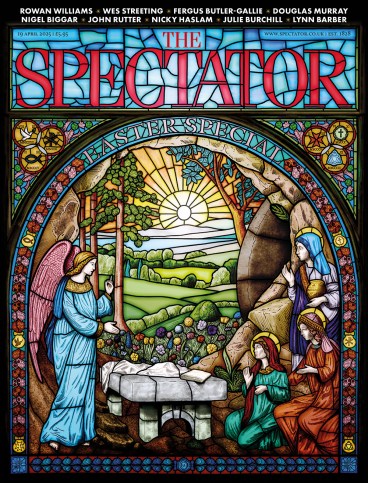
Lent did not, I confess, start well. Cheltenham fell in its first week, and the Gold Cup is hardly the place for the rigours of Lenten discipline to begin. Some might say it is hardly the place for a clergyman at all. Peter Hitchens once commented on my clerical collar – stiff, crisp, linen – and said that if he saw a man wearing such a get-up at a racecourse he would assume he was an illegal bookmaker in disguise. Still, I recall that one of the most successful owner-breeders of all time was a clergyman. The vicar of Ashby de la Launde, the Revd J.W. King, won the Oaks, 1,000 Guineas and St Leger with his horse, Apology. There were, as the Bible tells us, giants in the earth in those days.
A bad beginning to the 40 days and 40 nights caused me to seek comfort in the words of Charles Kingsley, who was dismissive of performative piety: ‘An effeminate shaveling ideal. A poor pitiful thing.’ The Church of England’s social media this Lent has been full of this. I’m sure the pallid and thin social media managers and climate activists who have been the faces of their ‘causes for hope’ mean very well, but it all seems very far from the days of brandy for the parson, baccy for the clerk.
The problem of modern Lent isn’t just uninspiring social media content from the Church. We aren’t very good at marking time any more. This is not just an ecclesiastical issue. A local gamekeeper recently complained to me that some shoots are flouting the well-established seasons that govern such things to seek corporate custom. Even the Twelfth is not as glorious as it was. I related to him the tale of the clergyman who was upbraided by his churchwarden for his commitment to country pursuits in season. There was nothing, the layman maintained, in the Bible that said that the Apostles went out shooting. The clergyman conceded this but pointed out that the game was very poor in Palestine. ‘Why,’ he asked, ‘do you think they went fishing instead?’
At the two churches where I am vicar – St Mary’s, Charlbury and All Saints, Shorthampton – we do our best to mark the beat of this older, holier time. In some ways this is quite literal: the clock at St Mary’s strikes the hour a few minutes after it has been reached by GMT or BST. Down with the tyranny of the railway clocks and up with Oxford time! Yet for all the erratic striking of the chimes, the truly countercultural time which we keep is that of the calendar. We have returned to the cycle of blessing Whitsun ales, of Advent prose and marking the saints and martyrs of old. Easter is the great moment for this: not just another bank holiday (a telling indictment of modern Britain – as if our free time is secured by bank managers) but instead the event which transfigures time itself, folding past, present and future into one joyous moment.
As such, links to the past are more important than ever at Easter. One member of Shorthampton’s congregation who’ll be there on Sunday will be the redoubtable Anne. She was born at Simla, where her father was an aide-de-camp to the viceroy. ‘Mountbatten?’ I asked when she first told me this. ‘Oh no, two before him.’ She is a one-woman link to the heart of the last century. She remembers the Hindi poetry her ayah taught her and visiting Spandau when Hess was a relatively recent inmate. She began our marking of Lenten observance with a faultless delivery of the portion of scripture appointed for the Epistle on Ash Wednesday. It is not for the sake of my own piety that I feel bad for having had a less rigorous Lent than usual: rather it is because among the good ordinary people of England – like Anne – we have such pre-eminent examples of real holiness.
If Lent has been riddled with examples of human failure, so is the institution of the Church itself. The C of E has seemingly spent much of the past six months in self-inflicted penitence. Her bishops might be platitudinous and vapid, her parish clergy might be demoralised, she might well be riddled with the pox of managerialism, but in the highways and hedges of England she still can speak of something hopeful and beautiful and true. She will proclaim so, loudly, this Easter. A message of life and grace, of Resurrection, in words that bind together past, present and future in the inevitable final triumph of God over time, of life over death and of love over all: Christ is Risen. He is Risen indeed. Hallelujah.
Fergus joined The Edition podcast to talk about assisted dying and life & death at Easter, alongside Dan Hitchens:
The Revd Fergus Butler-Gallie’s Twelve Churches: an Unlikely History of the Buildings that Made Christianity is published in August.








Comments